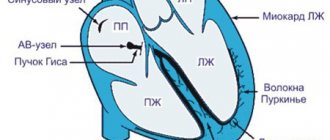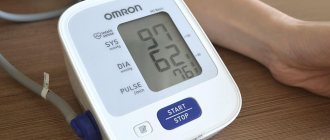Pharmacological properties
The drug Capoten is aimed at preventing the active production of the hormone angiotensin, which contributes to the narrowing of the lumen of blood vessels, resulting in an increase in blood pressure. By blocking the hormone, the vascular wall expands and excess fluid leaves the body.
Regular use of Capoten allows you to maintain normal blood pressure levels even after physical exertion
The wide spectrum of action of the drug allows you to reduce the amount of aldosterone produced due to its distribution into the adrenal cortex. The therapeutic effect of the drug is also aimed at reducing pressure in the right atrium and increasing the rate of cardiac output.
Once in the digestive tract, blood pressure tablets are quickly absorbed by the walls of the stomach under the action of enzymes. The patient can notice the therapeutic effect 10 minutes after consuming them. Achievement of the full pharmacological effect occurs 2 hours after the accumulation of the active substance in the bloodstream. The pharmacological effect of the drug lasts for 6-6.5 hours.
The drug is removed from the body by the excretory system, that is, it comes out with urine. The active substance is excreted in pure form and the percentage is about 60%, the rest of the drug is excreted in the form of metabolic products.
Reception and speed of action
Take Capoten according to the instructions and prescription of the doctor.
The tablets are swallowed whole (not crushed in any way) one hour before meals and washed down with a significant amount of water.
During the treatment course, it is recommended to take the tablets at the same time every day. Reception is prescribed 2–4 times a day.
Of course, many are interested in the question: “How long does it take for a blood pressure pill to work?” The method of administration plays a big role in the answer to this question. If you need “first aid”, then in order for the medicine to be absorbed at an accelerated rate, it is sometimes advised to place the tablet under the tongue.
In this case, Capoten quickly enters the bloodstream through the mucous membranes and begins to act faster than usual. As patients testify, when the tablet is dissolved, some relief occurs within a few minutes. The dose during resorption remains the same as during normal administration.
In general, due to the high absorption rate of the components, Capoten begins to “work” 10 minutes after entering the body and protects for 6 hours.
Often the patient feels the first signs of relief a little later than the onset of the drug’s effect.
The greatest effect is observed after 60 minutes. Patients are advised to take a relaxed position at this time and wait until the medicine has the desired effect.
A person usually feels relief within 15–20 minutes, depending on individual metabolic characteristics. Breaking and chewing also speeds up the action. If the tablet is absorbed under the tongue, the hypertensive crisis begins to weaken even faster - after 5–10 minutes.
However, you should not use this method often, because a sharp jump down is also unsafe. It should be recalled that Capoten can cause mental retardation and dizziness, so it is used with caution when it is necessary to control various mechanisms and engage in hazardous activities.
Combining any food with tablets slows down the absorption of the drug in the gastrointestinal tract by approximately 30-40%, which naturally affects the process of reducing blood pressure.
In some cases, to provide emergency care to patients, you need to use two tablets (with a mandatory break of up to 30 minutes). The blood pressure between and after taking the pills must be monitored very carefully in order to respond in time to changes in indicators.
Release form and composition
Most patients suffering from hypertension are interested in how long it takes for Capoten to work at high blood pressure. Thus, the hypotensive effect of the drug depends on the concentration of the active substance in one tablet. The drug is available in tablet form and has a specific odor. The tablets have a special mark in the form of a cross, which facilitates the dosing process.
Tablets are packed in a blister in quantities of 10 or 14 pieces
The main active component of the medication is the substance captopril, which lowers blood pressure. The medicine also contains excipients:
- cellulose;
- octadecanoic acid;
- corn starch;
- lactose;
- stearic acid.
The packaging of the medicine contains the active ingredient captopril in dosages of 25 and 50 mg.
What is Capoten and why should you take it?
Capoten is used to treat diseases such as:
- Arterial hypertension (essential and secondary)
- Chronic heart failure (CHF)
- Damages of the glomerular apparatus of the kidneys in diabetes (nephropathy)
- Post-myocardial infarction
One Capoten tablet contains 25 or 50 mg of Captopril, the active substance. In the group of ACE Inhibitors, Capoten analogues exist in large quantities, produced by different manufacturers. The drugs differ slightly in their chemical formula, for example - Berlipril, Liquinopril, Enap, Accupro, Quinafar. If desired, you can choose the cheapest and most accessible substitute, since they will work equally effectively.
Features of using Kapoten
According to the instructions for use of Capoten, absorption of 75% of drugs occurs in the digestive tract, and in the circulatory system - up to 30%. The release of the drug from the body occurs within 3 hours, but if there are disturbances in the functioning of the kidneys, the removal time increases. It is not recommended to take blood pressure medication while eating food, as this can slow down the absorption of active substances by 45%.
During the period of using the drug, experts recommend adhering to a salt-free diet.
After Capoten, men experience a libido disorder, especially with prolonged and uncontrolled use. The medication also reveals its antioxidant properties, thus preventing the development of cancer in patients.
It is unacceptable to drink alcohol during treatment with the drug, since ethanol disrupts the absorption and distribution of potassium in the body. And potassium deficiency leads to hypertension or worsening of the clinical picture of the disease.
Features of interaction with alcohol
It is dangerous to combine Capoten with ethanol contained in any alcoholic drink.
Since captopril, the main element of these tablets, tends to accumulate potassium in the body, the lack of which provokes disturbances in the functioning of blood vessels.
Alcohol-containing drinks activate its elimination. Therefore, treatment not only loses its meaning, but also contributes to the development of persistent hypertension.
Therefore, forget that alcohol dilates blood vessels, the opposite effect soon occurs, and no one has canceled the hangover syndrome. Sometimes the pressure does not rise regularly, and if this happens after drinking alcohol, then the tablet can be swallowed, but only as an exception and for the necessary normalization of the condition before the doctor arrives.
In this situation, the likelihood of such negative consequences increases: numbness and a feeling of cold in the extremities, tremors, loss of taste, as well as extremely dangerous pulmonary edema. In addition, in case of renal failure, taking these tablets is completely prohibited in any case. Another pitfall is that alcohol enhances the effect of the drug. In this case, an overdose and a hypotonic crisis occurs.
People who, for the sake of an “experiment,” try to drink alcohol to speed up the action of Capoten, risk greatly aggravating their health condition.
In what cases is the remedy prescribed?
The main goal of Kapoten is to stabilize blood pressure and restore vascular tone.
The drug is prescribed for impaired functional ability of the heart muscle and arterial insufficiency
High blood pressure can be caused by the following conditions:
- arterial essential hypertension;
- heart failure;
- impaired renal function due to insulin-dependent diabetes;
- disruption of the left ventricle after necrosis of part of the heart muscle;
- progressive angina;
- tachycardia of various etiologies;
- hypertension stages I and II;
- liver cirrhosis with hepatopathy.
Medicines are prescribed as a complex treatment for diseases associated with increased blood pressure. The use of Capoten as monotherapy is possible only in cases of moderate or slight increase in blood pressure. In addition to their main purpose, tablets are used to prevent pathologies of the heart and blood vessels, as well as as an adjuvant in systemic inflammatory processes.
The use of the drug must be agreed with a specialist so that he can select an individual treatment regimen taking into account all the characteristics of the patient’s body.
What side effects are there from taking capoten?
| Heart and blood vessels | A short-term drop in pressure, rapid heartbeat, which is restored when the patient assumes a horizontal position. This is a normal physiological reaction that does not require treatment. |
| Lungs and airways | Dry cough, coughing is the most common “symptom” of taking Captopril |
| Kidneys | The appearance of signs of renal failure - protein, urea nitrogen and creatinine in the urine. |
| Allergic reactions | Urticaria, flushing of the face due to vasodilation, redness. Rarely, vascular edema of the face and extremities is possible. |
| Digestion | Changes in taste, dry mouth, inflammation of the mucous membrane of the gums and cheeks. There are rare cases of inflammation of the pancreas and cholestatic jaundice. |
| central nervous system | Headache, drowsiness and insomnia, paresthesia (feeling of goosebumps running over the skin, tingling in different parts of the body). |
| Electrolyte disturbances | Hyperkalemia (with concomitant renal failure), hyponatremia (if the patient adheres to a salt-free diet). |
In case of overdose, a pronounced decrease in pressure, shock, electrolyte imbalance and acute renal failure occur.
Mechanisms of action
The drug helps normalize blood pressure through the following mechanisms:
- Elimination of vascular spasm (by increasing the level of biological active substances that reduce vascular tone, promoting the expansion of the vascular wall).
- The active substance captopril inhibits the conversion of the enzyme angiotensin 1 to angiotensin 2.
- Removal of excess fluid (the level of adrenal hormones decreases, resulting in a decrease in sodium in the body, which is why fluid is not retained).
- Reducing pressure in the pulmonary circulation (this helps prevent the development of pulmonary and bronchial asthma).
- Improved blood circulation (the vascular wall expands and cardiac output increases in one minute).
The drug reduces the load on the myocardium, which allows patients to easily endure physical activity
The mechanism of action of Capoten is aimed not only at preventing an increase in the level of pressure, but also at reducing it in cases where it has already reached its maximum values. The drug also shows its therapeutic effectiveness in cases of hypertension, which has developed against the background of diseases of the excretory system. Thus, during pathological processes in paired organs, the production of renin increases. This is a substance that combines with angiotensin to form angiotensin 1 into angiotensin 2. By blocking the production of angiotensin-converting enzyme, the increase in the level of the hormone angiotensin 2 is inhibited. However, in order for blood pressure to normalize, the underlying disease must be eliminated, since relapses are possible if the drug is stopped.
The broad mechanism of action of the drug allows it to be used after a heart attack as a restorative therapy, but only when the patient’s condition is stabilized. As a rule, the drug is prescribed 3 days after suffering from coronary heart disease. Taking the tablets is intended to prevent the development of heart failure caused by necrosis of a section of the heart muscle.
The drug reduces the risk of a recurrent heart attack by eliminating spasm of the coronary arteries and normalizing blood circulation in the myocardium.
Dose selection
Each patient needs to know how long it takes for the medicine to work if the individual dose is correctly selected and the presence of concomitant diseases.
Capoten for blood pressure is taken orally, swallowing the tablet as a whole. It is not recommended to crush or chew the tablet product. The dosage is selected for each patient individually; it is started with a small amount - 6-12 mg, then it needs to be doubled. Thus, the increase occurs 2 times every 7 days until the maximum permissible concentration is reached - 0.3 g. per day. It is not recommended to take a higher dose of the medication, since its effectiveness does not increase, and the risk of developing negative phenomena increases. The maximum permissible dose of the drug per day is 600 mg, since it does not bring pronounced changes in the condition of the patient’s body.
The drug is taken with a minimum starting dose, gradually increasing it to optimal values.
A diagram of how to take Capoten with high blood pressure against the background of pathologies of various etiologies:
- Hypertonic disease. The use of the medicine begins with a dose of 0.012 g. 2 times a day, after 2 weeks the daily dosage of the drug is doubled and gradually brought to the optimum, that is, to the concentration of the drug that is necessary to maintain normal blood pressure levels. For mild to moderate hypertension, the effective maintenance dosage of the drug is 0.025 g. 2 times a day. For malignant hypertension with severe symptoms, the corrective dose is 0.05 g. 2-3 times a day.
- Heart failure in the chronic stage. Capoten is prescribed in a situation where diuretics do not give the desired effect. In this case, the use of the medicine begins with a dosage of 1/4 of the tablet 3 times a day, gradually increasing the concentration by 2 times every 14 days until an acceptable individual dose is reached, which will ensure the necessary effectiveness. The maximum permissible dose per day is 150 mg.
- Impaired left ventricular activity after coronary artery disease. Taking Capoten is allowed after the patient’s well-being has normalized, as a rule, this occurs on the 3rd day after the attack. The initial concentration is 6.25 mg 1 time per day, then after 7 days the dosage is increased to 6.25 mg 2 times per day. After another 1 week, the dose is increased by 6.25 mg 3 times a day, thus increasing it by 2 times, starting at 12.5 mg 3 times a day.
- Diabetic nephropathy. An acceptable dose is 0.025 g. 3 times a day or 0.05 g. 2 times a day. The individual dosage is selected gradually, taking the drug begins with a low concentration of the substance - 12.5 mg 3 times a day.
- Nephropathy with albuminuria. The optimal dosage is 0.05 g. 2 times a day. For diseases of the excretory system, a maintenance concentration of the active substance is required, which is 0.08 g 1 time per day. In cases of severe pathology of paired organs, the medication is prescribed at an initial dose of 12.5 mg 2 times a day. This is followed by a systematic increase in the dose to a maximum concentration of 60-75 mg per day.
Elderly patients are recommended to select the dose of the drug on an individual basis. As a rule, the starting dose starts with 6.25 mg 2 times a day. This group of patients is not recommended to increase the concentration of the active substance; it must be maintained within the minimum acceptable limits. In cases where Capoten does not work, that is, there is no decrease in blood pressure, then it is necessary to increase the dosage by adding 3 doses of the drug per day. Consequently, the drug is taken at 6.25 mg several times a day, only after this it is possible to increase the single dose of the drug.
Dosage
In order to understand how quickly Capoten lowers blood pressure, you need to remember that it is intended for long-term use. Only completing the full course guarantees the absence of sudden and dangerous rises in pressure. The treatment regimen also plays an important role.
One of the main requirements for organizing treatment is a gradual adjustment of the dose towards an increase, after the doctor determines the degree of effectiveness of the medicine.
Dosage changes occur no earlier than 14–21 days after the previous prescription. Typically, the initial dosage for hypertension is 12.5 mg twice a day, and for heart failure and myocardial infarction - 6.25 mg. To achieve a good therapeutic effect for hypertension, it is increased to 50 mg (morning and evening).
It should be recalled that you can not be afraid of arterial hypertension only if you take it regularly. Indeed, despite the possibility of using the drug during a hypertensive crisis, the therapeutic effect after a single dose will be noticeable for a short time.
If arterial hypertension is unsystematic, then the initial single dose is 6.25 mg, and the number of doses is 3 (during the day).
In the future, 25 mg is prescribed three times a day in order to keep the indicators normal. If a severe form of the disease is diagnosed, the maximum acceptable daily dose reaches 150 mg.
Patients cannot change the dosage on their own, because only a doctor can choose the correct regimen for taking Capoten, especially if we are talking about chronic diseases or there are other concomitant health problems.
Use of the product during pregnancy
The use of Kapoten is strictly prohibited during pregnancy and breastfeeding, since the active substances in the drug have a negative effect on the intrauterine development of the fetus.
Taking medication in the first trimester of pregnancy is considered especially dangerous for the health and development of the fetus.
Taking the drug can provoke intrauterine fetal death or cause premature birth, so the woman is advised not to use it for the entire pregnancy. If a woman took the drug before pregnancy, then if an interesting situation is identified, she must immediately stop taking it.
Taking medication for hypertension
In the treatment of arterial hypertension, an important point is the question at what pressure to take Capoten tablets, so as not to provoke a sharp decrease in blood pressure. Thus, with normal or low blood pressure, complications associated with collapse may develop after using the drug. Therefore, it should become a rule for every patient that before taking medications for high blood pressure, it is necessary to measure blood pressure levels.
A hypertensive crisis develops against the background of a narrowing of the lumen of blood vessels, which disrupts normal blood circulation
Capoten is considered an emergency drug for arterial hypertension, but only if patients take it regularly 2-3 times a day. Regular and long-term use of the medication promotes the accumulation of active substances in the body, which makes it possible to smoothly lower blood pressure levels.
Very often, hypertension is complicated by a hypertensive crisis; in this condition, the patient needs emergency care, so doctors recommend that relatives learn basic first aid techniques for a hypertensive crisis.
Algorithm of what to do during a hypertensive crisis:
- The patient must be given a semi-sitting position to prevent an attack of suffocation and improve pulmonary ventilation.
- If the patient is taking medications for high blood pressure, he needs to take the next dose of his antihypertensive drug. To achieve a quick therapeutic effect, the product must be dissolved under the tongue.
- A gradual decrease in blood pressure by 30-40 mm over 30 minutes. Hg Art., if the medication does not reduce blood pressure, you must take an additional dose of the medication.
- A critical reduction in blood pressure to normal values is strictly prohibited, as this can lead to irreversible cerebrovascular accidents.
- To stabilize the psycho-emotional state, you can use sedatives, for example, Validol or Corvalol. This will help eliminate the patient’s feeling of fear, relieve excitability and anxiety.
- Before specialists arrive, you should not give the patient new medications, if Capoten does not reduce blood pressure, this will increase the risk of an allergic reaction.
- After localizing a hypertensive crisis, it is necessary to contact a cardiologist to adjust the dose or select a new antihypertensive drug.
Video on the topic
Review of drugs for hypertension and cardiovascular diseases Capoten and Captopril:
Capoten is one of the most effective drugs for high blood pressure. It is popular due to its efficiency, high speed, and affordable cost. The drug has proven itself in systemic treatment, and it can also be used as an “ambulance” for hypertensive crises, since when absorbed, it begins to act within a matter of minutes.
The information on the MyMedNews.ru website is for reference and general information, collected from publicly available sources and cannot serve as a basis for making a decision on the use of medications in the course of treatment.
MyMedNews.ru
And we also have
Medicines for high blood pressure from the “by-catch” group: list of drugs and features of their use
Side effects
Like any drug from the group of antihypertensive drugs, Capoten can cause a number of side effects in the form of disruption of the activity of various systems and organs.
An overdose of Capoten leads to the appearance of skin rashes, which are accompanied by severe itching.
The following side effects after taking the medication are distinguished:
- Digestive tract. A disorder occurs in the form of nausea, vomiting, abdominal pain, and defecation disorder.
- Central nervous system. Headaches, dizziness, poor sleep, and constant drowsiness are observed.
- The cardiovascular system. A sharp decrease in indicators with high blood pressure, arrhythmia, tachycardia.
- Excretory system. High urea content in the blood, high creatinine clearance.
- Allergy. Individual intolerance to the drug can be complicated by angioedema, changes in the biochemical composition of the blood are observed. Violation of the functional abilities of the excretory, reproductive and respiratory systems.
If the treatment regimen is not followed and an uncontrolled dose of medication is taken, serious complications may occur, such as pulmonary edema, cerebral hemorrhage and cardiac dysfunction. It is important for patients to know that an antihypertensive drug can affect all major body functions, so it should be taken with extreme caution.
If side effects occur, you must inform your specialist so that he can stop taking the medication or select its optimal dosage.
Capoten has a pronounced hypotensive effect, so it is important to constantly monitor blood pressure levels, since a sharp decrease is possible. If side effects develop in case of an overdose of the drug, the patient should receive emergency assistance and consult a doctor to adjust the dose. Also, when treating with the drug, it is necessary to take into account concomitant diseases and pathologies of the excretory system, heart and blood vessels, since it is necessary to reduce the dose of the drug.
Capoten
Arterial hypotension
In patients with arterial hypertension, when using captopril, severe arterial hypotension is observed only in rare cases. The likelihood of developing this condition increases with increased fluid loss and hyponatremia (for example, after intensive treatment with diuretics, restriction of sodium intake, in patients on dialysis, and in patients with diarrhea or vomiting).
Captopril should be prescribed with caution to patients on a low-salt or salt-free diet. Circulating blood volume and blood sodium levels should be adjusted before captopril is prescribed.
The possibility of a sharp decrease in blood pressure can be minimized by first withdrawing (4-7 days before) the diuretic or increasing sodium chloride intake (about a week before starting treatment), or by prescribing low doses of captopril at the beginning of treatment (6.25-12 .5 mg/day).
Renal function should be regularly monitored before and during treatment with captopril. Excessive reduction in blood pressure due to antihypertensive medications may increase the risk of myocardial infarction or stroke in patients with coronary heart disease or cerebrovascular disease. If arterial hypotension develops, the patient should take a horizontal position with legs elevated. Intravenous administration of 0.9% sodium chloride solution may be required.
In patients with CHF, a transient decrease in blood pressure by more than 20% of the initial value is observed in approximately half of the cases. The degree of reduction in blood pressure is maximum in the early stages of treatment (after taking the first few doses of captopril) and stabilizes within one to two weeks from the start of treatment. Blood pressure usually returns to baseline without a decrease in therapeutic efficacy within two months.
In patients with CHF, treatment should begin with low doses of captopril (6.25-12.5 mg/day) under medical supervision. Increasing the dose of captopril should be done with extreme caution. Transient arterial hypotension in itself is not a reason to discontinue treatment. In cases where arterial hypotension becomes stable, the dose should be reduced and/or discontinued use of the diuretic and/or captopril.
Aortic or mitral stenosis/hypertrophic obstructive cardiomyopathy
Like all drugs that have a vasodilating effect, ACE inhibitors should be used with extreme caution in patients with left ventricular outflow tract obstruction. In case of hemodynamically significant obstruction, the use of captopril is not recommended.
Renal dysfunction
Some patients with kidney disease, especially those with severe renal artery stenosis, experience increases in serum urea nitrogen and creatinine concentrations after lowering blood pressure. This increase is usually reversible when captopril therapy is discontinued. In these cases, it may be necessary to reduce the dose of captopril and/or discontinue the diuretic.
With long-term use of captopril, approximately 20% of patients experience an increase in serum urea and creatinine concentrations by more than 20% compared with normal or baseline values.
In less than 5% of patients, especially with severe nephropathy, treatment discontinuation is required due to an increase in creatinine concentration.
Renovascular hypertension
Patients with bilateral renal artery stenosis or stenosis of the artery of a solitary kidney have an increased risk of developing arterial hypotension and renal failure when using ACE inhibitors. Renal failure may initially manifest itself as only slight changes in plasma creatinine levels. The use of captopril in such patients is not recommended.
Kidney transplant
There is no experience with the use of captopril in patients who have recently undergone kidney transplantation. Therefore, the use of captopril in such patients is not recommended.
Proteinuria
When using captopril, 0.7% of patients had proteinuria more than 1000 mg per day. In 90% of cases, proteinuria occurred in patients with impaired renal function, as well as when using high doses of captopril (more than 150 mg per day). Approximately 20% of patients with proteinuria developed nephrotic syndrome. In most cases, proteinuria disappeared or decreased in severity after taking captopril within 6 months, regardless of whether the drug was stopped or not. Renal function tests (blood urea nitrogen and creatinine concentrations) in patients with proteinuria were almost always within normal limits. In patients with kidney disease, the protein content in the urine should be determined before starting treatment and periodically throughout the course of therapy.
Liver dysfunction
In rare cases, the use of ACE inhibitors has been accompanied by the development of a syndrome that begins with the appearance of cholestatic jaundice or hepatitis and progresses to fulminant liver necrosis, sometimes with death. The mechanism of development of this syndrome is unknown. If a patient receiving ACE inhibitor therapy develops jaundice or a significant increase in liver enzyme activity, captopril treatment should be discontinued and appropriate adjuvant therapy should be instituted. The patient should be under appropriate supervision.
Neutropenia/agranulocytosis/thrombocytopenia/anemia
Cases of neutropenia/agranulocytosis, thrombocytopenia and anemia have been reported in patients taking ACE inhibitors. Neutropenia is rare in patients with normal renal function and no other abnormalities. In renal failure, simultaneous administration of captopril and allopurinol led to neutropenia.
Captopril should be used with extreme caution in patients with systemic connective tissue diseases (systemic lupus erythematosus, scleroderma, etc.) taking immunosuppressants, allopurinol or procainamide, or a combination of these complicating factors, especially if there are pre-existing renal dysfunction.
In 13% of cases with neutropenia, death was observed. In almost all cases, death was observed in patients with connective tissue diseases, renal or heart failure, while taking immunosuppressants, or a combination of both of these factors.
Due to the fact that the majority of fatal cases of neutropenia due to ACE inhibitors developed in such patients, their white blood cell count should be monitored before starting treatment, in the first 3 months - every 2 weeks, then every 2 months. In all patients, the number of leukocytes in the blood should be monitored monthly in the first 3 months after starting captopril therapy, then every 2 months. If the number of leukocytes is below 4000/μl, a repeat general blood test is indicated; below 1000/μl, the drug is stopped while monitoring the patient continues. Typically, restoration of the number of neutrophils occurs within 2 weeks after discontinuation of captopril.
Some patients developed serious infectious diseases, which in some cases did not respond to intensive antibiotic therapy. When using captopril in patients with a high risk of neutropenia/agranulocytosis, regular monitoring of the number of leukocytes in the blood is recommended. Patients should be warned to seek immediate medical attention if any signs of an infectious disease (eg, fever, sore throat) occur.
Hypersensitivity reactions/angioedema
Rare cases of angioedema of the face, extremities, lips, tongue, vocal folds and/or larynx have been observed with the use of ACE inhibitors, including captopril. Angioedema may develop at any time during treatment.
If angioedema develops, you should immediately stop taking captopril and carefully monitor the patient's condition until symptoms disappear completely.
If the swelling is localized to the face, no special treatment is usually required (antihistamines can be used to reduce the severity of symptoms). Even in cases where only swelling of the tongue is observed without the development of respiratory distress syndrome, patients may require long-term observation, since therapy with antihistamines and corticosteroids may not be sufficient.
Angioedema, associated with swelling of the larynx and tongue, can be fatal in very rare cases. If the swelling spreads to the tongue, pharynx or larynx and there is a threat of developing airway obstruction, 0.3-0.5 ml of a 0.1% solution of epinephrine (adrenaline) should be immediately administered subcutaneously and/or ensure airway patency ( intubation or tracheostomy).
In rare cases, during therapy with ACE inhibitors, intestinal edema (angioedema of the intestines) has developed, which is manifested by abdominal pain in combination with or without nausea and vomiting, sometimes without previous angioedema of the face and with normal levels of C1-esterase. Diagnosis is made using abdominal computed tomography, ultrasound, or surgery. Symptoms disappeared after stopping the ACE inhibitors. The possibility of developing intestinal edema must be taken into account when carrying out the differential diagnosis of abdominal pain in patients taking ACE inhibitors.
Patients with a history of angioedema not associated with ACE inhibitors may be at greater risk of developing angioedema during ACE inhibitor therapy.
In representatives of the Negroid race, cases of the development of angioedema when using ACE inhibitors were observed with a higher frequency compared to representatives of other races.
An increased risk of angioedema was observed in patients concomitantly taking ACE inhibitors and drugs such as mTOR inhibitors (temsirolimus, sirolimus, everolimus), dipeptidyl peptidase type IV inhibitors (sitagliptin, saxagliptin, vildagliptin, linagliptin), estramustine, neutral endopeptidase inhibitors (racecadotril). , sacubitril) and tissue plasminogen activators.
Anaphylactoid reactions during desensitization with an allergen from Hymenoptera venom
In rare cases, during therapy with ACE inhibitors, life-threatening anaphylactoid reactions were observed in patients undergoing desensitization with an allergen from the venom of Hymenoptera. In such patients, these reactions were prevented by temporarily stopping ACE inhibitor therapy before desensitization began. The use of captopril should be avoided in patients receiving bee venom immunotherapy.
Anaphylactoid reactions during low-density lipoprotein apheresis (LDL apheresis)
Life-threatening anaphylactoid reactions have rarely been observed in patients taking ACE inhibitors during LDL apheresis using dextran sulfate. The development of these reactions can be prevented by temporarily discontinuing the ACE inhibitor before each LDL apheresis procedure.
Hemodialysis using high-flow membranes
When performing hemodialysis in patients receiving ACE inhibitors, the use of high-flow polyacrylonitrile dialysis membranes (for example, AN69®) should be avoided, since in such cases the risk of developing anaphylactoid reactions increases. In such cases, it is necessary to use a different type of dialysis membrane or use antihypertensive drugs of other classes.
Diabetes
In patients with diabetes mellitus receiving oral hypoglycemic agents or insulin while using ACE inhibitors, blood glucose concentrations should be regularly monitored.
Patients taking oral hypoglycemic agents or insulin should be informed before starting the use of ACE inhibitors of the need to regularly monitor blood glucose concentrations (hypoglycemia), especially during the first month of simultaneous use of these drugs.
Cough
When taking ACE inhibitors, a characteristic cough is often observed. As a rule, the cough is non-productive, constant and stops after discontinuation of the drug. Cough associated with the use of ACE inhibitors should be considered in the differential diagnosis of dry cough.
Surgical interventions / general anesthesia
During major surgical operations, as well as when using general anesthesia agents that have an antihypertensive effect, patients taking ACE inhibitors may experience an excessive decrease in blood pressure (since captopril blocks the formation of angiotensin II, caused by compensatory release of renin). In such cases, to correct low blood pressure, measures aimed at increasing the volume of circulating blood are used.
Hyperkalemia
In some cases, against the background of the use of ACE inhibitors, incl. captopril, an increase in serum potassium levels is observed.
Risk factors for the development of hyperkalemia are renal failure, old age (over 65 years), diabetes mellitus, some concomitant conditions (decrease in blood volume, acute heart failure in the stage of decompensation, metabolic acidosis), simultaneous use of potassium-sparing diuretics (such as spironolactone, eplerenone, triamterene or amiloride), as well as potassium preparations, potassium-containing table salt substitutes and other drugs that increase the level of potassium in the blood plasma (such as heparin, tacrolimus, cyclosporine; drugs containing co-trimoxazole [trimethoprim + sulfamethoxazole]).
The use of potassium supplements, potassium-sparing diuretics, or potassium-containing table salt substitutes, especially in patients with impaired renal function, can lead to a significant increase in serum potassium levels. Hyperkalemia can cause serious heart rhythm disturbances, sometimes fatal. It is recommended to avoid the simultaneous use of potassium-sparing diuretics and potassium supplements. If it is necessary to simultaneously use captopril and the drugs listed above containing potassium or increasing the potassium content in the blood plasma, caution should be exercised and the potassium content in the blood serum should be regularly monitored.
Hypokalemia
When using ACE inhibitors simultaneously with thiazide diuretics, the risk of hypokalemia cannot be excluded. Therefore, in such cases, regular monitoring of potassium levels in the blood should be carried out during therapy.
Dual blockade of the renin-angiotensin-aldosterone system (RAAS)
The simultaneous use of drugs from different groups that act on the RAAS is not recommended (double blockade of the RAAS), since it has been associated with an increased incidence of side effects such as arterial hypotension, hyperkalemia, and decreased renal function (including acute renal failure). The simultaneous use of ACE inhibitors with medicinal products containing aliskiren is contraindicated in patients with diabetes mellitus and/or with moderate or severe renal impairment (GFR less than 60 ml/min/1.73 m2 body surface area) and is not recommended in other patients.
Concomitant use of ACE inhibitors with angiotensin II receptor antagonists is contraindicated in patients with diabetic nephropathy and is not recommended in other patients.
In cases where the simultaneous administration of two drugs acting on the RAAS is necessary, their use should be carried out under the supervision of a physician with extreme caution and with regular monitoring of renal function, blood pressure and electrolyte levels in the blood plasma.
Lithium preparations
The simultaneous use of captopril and drugs containing lithium is not recommended due to the risk of potentiating the toxicity of the latter.
Ethnic differences
ACE inhibitors are less effective in blacks than in Caucasians, which may be due to the higher prevalence of low renin activity in blacks.
Other
When taking captopril, a false-positive urine test for acetone may occur.
Reviews
Olga, 47 years old, I have been suffering from hypertension for 5 years, so I can experience a hypertensive crisis even after a little stress or physical activity. I always carry Capoten tablets in my purse; they help me quickly lower my blood pressure, even on public transport. When I feel that my blood pressure is rising and my head starts to hurt badly, I put the tablet under my tongue and slowly dissolve it. The effect is noticeable within 10 minutes.
Victor, 45 years old One day I felt that my condition was deteriorating sharply, I measured my blood pressure, which at that time was 190/125 mm. Hg Art. My wife called an ambulance, which immediately gave me Capoten’s drug to take under my tongue. The next day I visited the attending physician, he selected a treatment regimen with Capoten. Now I use the drug regularly at the optimal dose for me, 25 mg 2 times a day.
Evgeniya, 36 years old, due to type 1 diabetes, I developed diabetic hypertension, the doctor prescribed me to take Capoten. At the moment I have been taking the medicine for 2 years, it helps me maintain normal blood pressure levels without sudden changes. However, recently I began to notice that red rashes appeared on my skin, which were accompanied by severe itching. The doctor said that this group of drugs very often causes side effects, and if the symptoms become severe, the drug will need to be replaced with another antihypertensive drug.
Kapoten: what is it for?
Capoten (captopril) is an ACE inhibitor. It was discovered back in the 1970s of the 20th century. A study of kidney function in the development of hypertension identified angiotensin-converting enzyme, which the kidneys produce to increase blood pressure.
The hypotensive effect of Capoten is explained by the suspension of the production of angiotensin II, which thereby minimizes its vasoconstrictive effect and also eliminates water retention in the body.
Capoten tablets
In addition, the drug reduces the synthesis of aldosterone, a hormone whose final result is an increase in systemic blood pressure. In addition, the effect of the drug also has a positive effect on the heart: preload weakens, systolic pressure in the right ventricle drops, and cardiac output increases.
With regular use, tolerance to physical and other stress increases and well-being improves. The main indication for use is problems with high blood pressure.
Capoten is recommended for use in the following diseases:
- arterial hypertension (both with moderate and significant increases). Prescribed as monotherapy or combined with various medications;
- congestive heart failure. In case of ineffective use of cardiac glycosides;
- heart attack;
- diabetic nephropathy;
- kidney pathology causing hypertension.
A full examination before starting to take the drug and, if necessary, careful medical monitoring during treatment will minimize the risks associated with its use.
In fact, these tablets can be included in the treatment plan by the attending physician in other cases if there is a concomitant appearance of hypertension against the background of the underlying disease.








